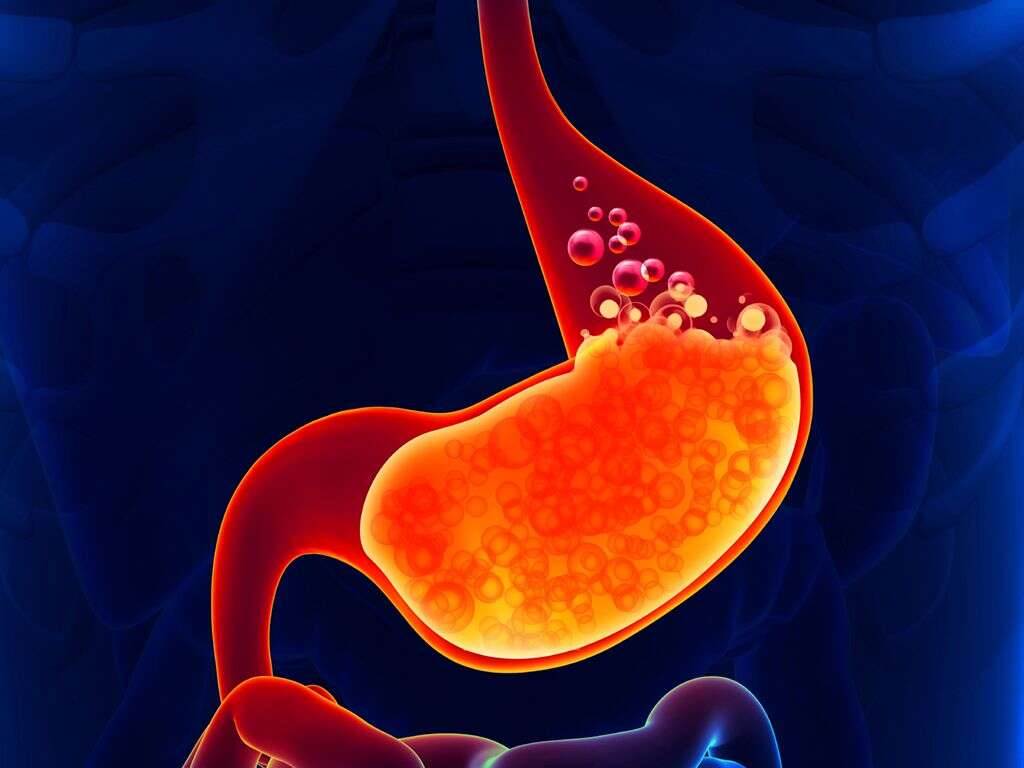10 Acid Reflux Symptoms
The entrance to our stomach has a ring of muscle that we know as the gastroesophageal sphincter. The job of this muscle is to close the stomach shut tight after food has been allowed in. This helps prevent food and the stomach’s digestive juices from escaping.
If the gastroesophageal sphincter does not stay tightly closed, though, then the stomach’s contents may be able to escape. This can allow the acidic juices of the stomach to rise up the unprotected soft tissue of the esophagus. This causes a burning sensation that is often known as acid reflux. It can be very uncomfortable and can also lead to a range of other symptoms.

Symptom #1: Burning Sensation
The juices in our stomachs are corrosive. This is because they help to break down food so that its nutrients can then be absorbed by the body. This is not a problem for us, though, because our digestive system is lined with a protective lining. This helps to protect our soft tissues from the corrosive effects of the stomach’s juices.
Our esophagus does not have such a protective lining, though. This means that the soft tissues lining the esophagus can be burned by the acidic juices of the stomach. This results in a burning sensation when acid reflux occurs. It is perhaps the most typical symptom of acid reflux and it can be very uncomfortable.

Symptom #2: Lump in Throat
Most of us are likely to have experienced the sensation of having a lump in our throats at some point. It can happen even when there is no physical lump present and is known medically as a globus sensation [^2]. It is not usually something to be concerned about and will normally pass harmlessly in time.
The globus sensation can be caused by a number of things, including acid reflux. It is not usually painful, although it can still be uncomfortable to bear at times. It is also not usually long-lasting although some cases will last longer than others. If symptoms persist, it might be a good idea to see a doctor to pinpoint the underlying cause.

Symptom #3: Laryngitis
Our ability to use complex speech patterns is largely down to our voice box. Known medically as the larynx, this part of the body contains vocal cords which help us to alter the frequency of airwaves as they leave our mouths. This allows us to speak, shout and even sing.
The voice box is quite a delicate organ, though, and is susceptible to damage. The soft tissues can be affected by the acidity of the stomach’s juices, causing some pain and swelling of the voice box. In addition to pain and soreness, the patient can also find that their voice changes or that they have difficulty speaking at all.

Symptom #4: Cough
Coughs are usually unpleasant, but often necessary. They are often a reflex response to something being in the throat that should not be there. The coughing action will help to expel the object from the throat, helping to keep the airways clear. A cough can also be caused by a wide range of illnesses.
The corrosive nature of the stomach’s juices on the esophagus can sometimes cause a cough. This, when combined with the burning already caused by acid reflux, can result in a cough that is very unpleasant indeed. Remedies are available that can help soothe the throat and relieve you of a cough.

Symptom #5: Chest Pain
Chest pain will quite often have people concerned about their health. This is understandable because the chest area is home to vital organs such as the heart and the lungs, and a pain in the chest can indicate that something is wrong. The good news, though, is that a pain in the chest is not always going to be an indicator of something serious.
People with acid reflux will often experience a sharp pain in the chest. This can be quite alarming to begin with, but the patient will generally get used to it as they experience it more often. Bear in mind that having acid reflux does not mean that chest pain cannot mean something serious. You should treat it urgently if the pain feels worse or different somehow.

Symptom #6: Regurgitating
When our food goes down into our stomach, it will usually stay there until it is fully digested. It’s better that it does stay there as well, at least until it comes out at the other end of the digestive system. Having been in the stomach, it will be very acidic and not at all pleasant to have in the mouth again.
People with acid reflux will sometimes find that food is regurgitated involuntarily back into their mouths. It can also sometimes be a sour, acidic liquid that tastes very unpleasant. There is often little that can be done other than swallowing it back down again.

Symptom #7: Asthma
Asthma is a condition that causes a narrowing of the airways under certain conditions. It can make it very difficult for the sufferer to breathe and, in some cases, it can be potentially very dangerous. It can be a result of a range of causes, and acid reflux is one potential cause.
People with acid reflux may find that they develop asthma when they’ve never had it before. Those that already have asthma can find that their existing condition gets worse. It is something that can be serious so you should speak with a doctor if you have developed the condition. Treating the acid reflux can help to limit the seriousness of the associated asthma.

Symptom #8: Bad Breath
Bad breath is one of the embarrassing situations that we do what we can to avoid. This often means avoiding eating certain types of food and, of course, brushing and flossing regularly. It is usually caused by a build-up of odor-producing bacteria in the mouth but this is not always the cause.
In some cases of acid reflux, odors, as well as juices, can escape from the stomach and up into the mouth. This produces bad breath and can also result in a bad taste in the mouth for the patient. It can be particularly noticeable in the morning if gases and juices have been escaping from the stomach overnight.

Symptom #9: Difficulty Swallowing
Swallowing is a natural reflex that does not have to be learned… even newborn babies can do it. It helps to force food down into the stomach where it can then be digested, allowing us to take nutrition from it. If we do develop certain conditions, though, then even swallowing can become difficult for us.
The effects of acidic juices on the esophagus, along with any cough the patient might have, can cause the throat to become quite sore. This can make it difficult to swallow and discourage the patient from eating. It is important to try and keep on taking in nutrition, though, no matter how painful swallowing may be.

Symptom #10: Lack of Sleep
Sleep is very important to us. Anybody that has been a day or two without sleep can tell you that it can be difficult to function. Concentrating becomes very difficult and completing even simple tasks can become a real challenge. If we go without sleep for too long, then things can start getting quite serious indeed.
Acid reflux can get worse when the patient is laying down, causing increased pain and discomfort. This can make it difficult for them to sleep, and this can lead to an additional drop in their quality of life. If you are experiencing difficulty sleeping for any reason, you should arrange to speak with a medical professional.












